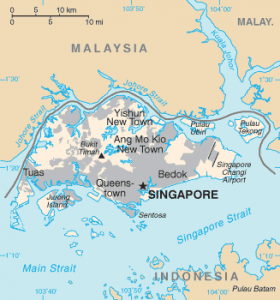NewsDesk @bactiman63
In a follow-up on the dengue fever outbreak in Singapore in 2022, the National Environment Agency (NEA) reports 9,895 total cases through May 20.

The number of weekly reported dengue cases has been rising sharply, even before Singapore reaches the traditional peak dengue season from June to October. 1,323 dengue cases were reported in the week ending 14 May 2022, 470 cases more than in the previous week.
As of 17 May 2022, there are 300 active dengue clusters, with 68 dengue clusters with red colour alert (i.e. cluster with 10 or more cases). Dengue virus serotype 3 (DENV-3) has been detected in 57 of the 68 dengue clusters with red colour alert. In April 2022, the Aedes aegypti mosquito population (the primary dengue vector) remained high in Singapore, and was about 22 per cent higher than in the same period last year (April 2021).
The high Aedes aegypti mosquito population, together with circulation of the previously uncommon DENV-3, will lead to a further surge in dengue cases in the coming months. Everyone must urgently do their part to remove stagnant water from our environment and maintain good housekeeping, to deprive mosquitoes of potential breeding habitats.
Most mosquito breeding continues to be found in homes. All occupants and occupiers of premises must Do the Mozzie Wipeout ‘B-L-O-C-K’ steps regularly, to remove stagnant water in premises and surroundings:
‘B-L-O-C-K’ steps
Break up hardened soil
Lift and empty flowerpot plates
Overturn pails and wipe their rims
Change water in vases
Keep roof gutters clear and place BTI insecticide inside
For households found with repeat mosquito breeding offences and multiple mosquito breeding habitats, offenders may face a fine of up to $5,000, or imprisonment for a term not exceeding three months, or both, for the first court conviction. Repeat offenders will be given heftier penalties or sent to court.
- Fiji reports more than 2000 lab-confirmed leptospirosis cases year to date
- England monkeypox cases now total 20, ‘We expect this increase to continue in the coming days’
- Canada: Two monkeypox cases confirmed in Quebec
- Spain: 7 confirmed monkeypox cases reported in the Community of Madrid
- Portugal monkeypox update: 23 confirmed cases
- Australia reports two monkeypox cases- One in Victoria and one in New South Wales
- Japanese encephalitis in Australia update

